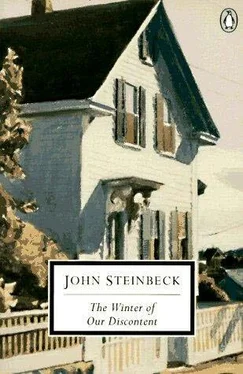John Steinbeck - The Winter of Our Discontent
Здесь есть возможность читать онлайн «John Steinbeck - The Winter of Our Discontent» весь текст электронной книги совершенно бесплатно (целиком полную версию без сокращений). В некоторых случаях можно слушать аудио, скачать через торрент в формате fb2 и присутствует краткое содержание. Жанр: Классическая проза, на английском языке. Описание произведения, (предисловие) а так же отзывы посетителей доступны на портале библиотеки ЛибКат.
- Название:The Winter of Our Discontent
- Автор:
- Жанр:
- Год:неизвестен
- ISBN:нет данных
- Рейтинг книги:5 / 5. Голосов: 1
-
Избранное:Добавить в избранное
- Отзывы:
-
Ваша оценка:
- 100
- 1
- 2
- 3
- 4
- 5
The Winter of Our Discontent: краткое содержание, описание и аннотация
Предлагаем к чтению аннотацию, описание, краткое содержание или предисловие (зависит от того, что написал сам автор книги «The Winter of Our Discontent»). Если вы не нашли необходимую информацию о книге — напишите в комментариях, мы постараемся отыскать её.
The Winter of Our Discontent — читать онлайн бесплатно полную книгу (весь текст) целиком
Ниже представлен текст книги, разбитый по страницам. Система сохранения места последней прочитанной страницы, позволяет с удобством читать онлайн бесплатно книгу «The Winter of Our Discontent», без необходимости каждый раз заново искать на чём Вы остановились. Поставьте закладку, и сможете в любой момент перейти на страницу, на которой закончили чтение.
Интервал:
Закладка:
Three years with honors and then expelled. It killed his parents, they say, and it killed most of Danny. All that remained was this shuffling sorrow—this wandering night sorrow cadging dimes for a pint of skull-buster. I think the English would say, “He’s let the side down,” and that always wounds the let-downer more than the side. Danny’s a night wanderer now, an early-morning man, a lonely, dragging thing. When he asks for a quarter for skull-buster his eyes beg you to forgive him because he can’t forgive himself. He sleeps in a shack in back of the boat works where Wilburs used to be shipbuilders. I stooped over his track to see whether he was headed home or away. By the scuff of the frost he was going out and I might meet him any place. Wee Willie wouldn’t lock him up. What would be the good?
There was no question where I was going. I had seen and felt and smelled it before I got out of bed. The Old Harbor is pretty far gone now. After the new breakwater went in and the municipal pier, sand and silt crept in and shallowed that once great anchorage sheltered by the jagged teeth of Whitsun Reef. And where once were shipways and ropewalks and warehouses and whole families of coopers to make the whale-oil casks, and docks too over which the bowsprits of whalers could project to their chain stays and figure- or fiddleheads. Three-masters they were usually, square-rigged; the after mast carried square sails as well as boom-and-gaff spanker—deep-hulled ships built to suffer the years at sea in any weather. The flying jib boom was a separate spar and the double dolphin-striker served as spritsail gaffs as well.
I have a steel engraving of the Old Harbor chockablock with ships, and some faded photographs on tin, but I don’t really need them. I know the harbor and I know the ships. Grandfather rebuilt it for me with his stick made from a narwhal’s horn and he drilled me in the nomenclature, rapping out the terms with his stick against a tide-bared stump of a pile of what was once the Hawley dock, a fierce old man with a white whisker fringe. I loved him so much I ached from it.
“All right,” he’d say, in a voice that needed no megaphone from the bridge, “sing out the full rig, and sing it loud. I hate whispering.”
And I would sing out, and he’d whack the pile with his narwhal stick at every beat. “Flying jib,” I’d sing (whack), “outer jib” (whack), “inner jib, jib” (whack! whack!).
“Sing out! You’re whispering.”
“Fore skys’l, fore royal, fore topgal’n’t s’l, fore upper tops’l, fore lower tops’l, fores’l”—and every one a whack.
“Main! Sing out.”
“Main skys’l”—whack.
But sometimes, as he got older, he would tire. “Belay the main,” he would shout. “Get to the mizzen. Sing out now.”
“Aye, sir. Mizzen skys’l, mizzen royal, mizzen t’gal’n’t, mizzen upper tops’l, mizzen lower tops’l, crossjack—”
“And?”
“Spanker.”
“How rigged?”
“Boom and gaff, sir.”
Whack—whack—whack—narwhal stick against the water-logged pile.
As his hearing got fuzzier, he accused more and more people of whispering. “If a thing’s true, or even if it ain’t true and you mean it, sing out,” he would cry.
Old Cap’n’s ears may have gone wonky toward the end of his life, but not his memory. He could recite you the tonnage and career of every ship, it seemed like, that ever sailed out of the Bay, and what she brought back and how it was divided, and the odd thing was that the great whaling days were nearly over before he was master. Kerosene he called “skunk oil,” and kerosene lamps were “stinkpots.” By the time electric lights came, he didn’t care much or maybe was content just to remember. His death didn’t shock me. The old man had drilled me in his death as he had in ships. I knew what to do, inside myself and out.
On the edge of the silted and sanded up Old Harbor, right where the Hawley dock had been, the stone foundation is still there. It comes right down to the low-tide level, and high water laps against its square masonry. Ten feet from the end there is a little passage about four feet wide and four feet high and five feet deep. Its top is vaulted. Maybe it was a drain one time, but the landward entrance is cemented in with sand and broken rock. That is my Place, the place everybody needs. Inside it you are out of sight except from seaward. There’s nothing at Old Harbor now but a few clammers’ shacks, rattlety things, mostly deserted in the winter, but clammers are a quiet lot anyway. They hardly speak from day’s end to end and they walk with their heads down and their shoulders bowed.
That was the place I was headed for. I spent nighttide there before I went in the service, and the nighttide before I married my Mary, and part of the night Ellen was born that hurt her so bad. I was compelled to go and sit inside there and hear the little waves slap the stone and look out at the sawtooth Whitsun rocks. I saw it, lying in bed, watching the dance of the red spots, and I knew I had to sit there. It’s big changes take me there—big changes.
South Devon runs along the shore, and there are lights aimed at the beach put there by good people to keep lovers from getting in trouble. They have to go somewhere else. A town ordinance says that Wee Willie has to patrol once an hour. There wasn’t a soul on the beach—not a soul, and that was odd because someone is going fishing, or fishing, or coming in nearly all the time. I lowered myself over the edge and found the outcrop stone and doubled into the little cave. And I had hardly settled myself before I heard Wee Willie’s car go by. That’s twice I had avoided passing the time of night with him.
It sounds uncomfortable and silly, sitting cross-legged in a niche like a blinking Buddha, but some way the stone fits me, or I fit. Maybe I’ve been going there so long that my behind has conformed to the stones. As for its being silly, I don’t mind that. Sometimes it’s great fun to be silly, like children playing statues and dying of laughter. And sometimes being silly breaks the even pace and lets you get a new start. When I am troubled, I play a game of silly so that my dear will not catch trouble from me. She hasn’t found me out yet, or if she has, I’ll never know it. So many things I don’t know about my Mary, and among them, how much she knows about me. I don’t think she knows about the Place. How would she? I’ve never told anyone. It has no name in my mind except the Place—no ritual or formula or anything. It’s a spot in which to wonder about things. No man really knows about other human beings. The best he can do is to suppose that they are like himself. Now, sitting in the Place, out of the wind, seeing under the guardian lights the tide creep in, black from the dark sky, I wondered whether all men have a Place, or need a Place, or want one and have none. Sometimes I’ve seen a look in eyes, a frenzied animal look as of need for a quiet, secret place where soul-shivers can abate, where a man is one and can take stock of it. Of course I know of the theories of back to the womb and the death-wish, and these may be true of some men, but I don’t think they are true of me, except as easy ways of saying something that isn’t easy. I call whatever happens in the Place “taking stock.” Some others might call it prayer, and maybe it would be the same thing. I don’t believe it’s thought. If I wanted to make a picture of it for myself, it would be a wet sheet turning and flapping in a lovely wind and drying and sweetening the white. What happens is right for me, whether or not it is good.
There were plenty of matters to consider and they were jumping and waving their hands for attention like kids in school. Then I heard the slow puttering of a boat engine, a onelunger, a fishing craft. Her masthead light moved south beyond the Whitsun rocks. I had to put everything aside until she turned her red and green lights safe in the channel, a local boat to have found the entrance so easily. She dropped anchor in the shallows and two men came ashore in her skiff. Little wavelets brushed the beach and the disturbed gulls took time to settle back on the mooring floats.
Читать дальшеИнтервал:
Закладка:
Похожие книги на «The Winter of Our Discontent»
Представляем Вашему вниманию похожие книги на «The Winter of Our Discontent» списком для выбора. Мы отобрали схожую по названию и смыслу литературу в надежде предоставить читателям больше вариантов отыскать новые, интересные, ещё непрочитанные произведения.
Обсуждение, отзывы о книге «The Winter of Our Discontent» и просто собственные мнения читателей. Оставьте ваши комментарии, напишите, что Вы думаете о произведении, его смысле или главных героях. Укажите что конкретно понравилось, а что нет, и почему Вы так считаете.











